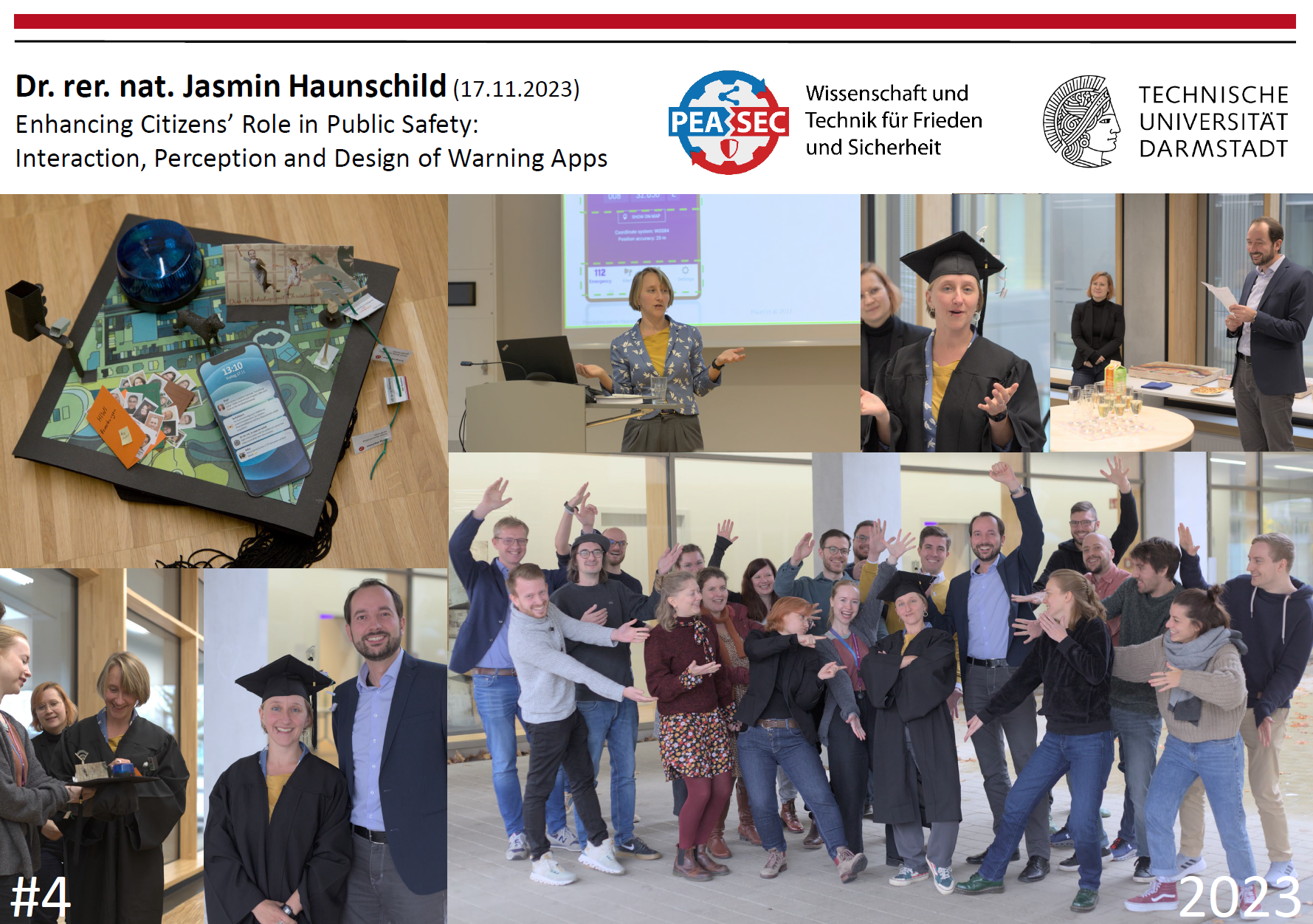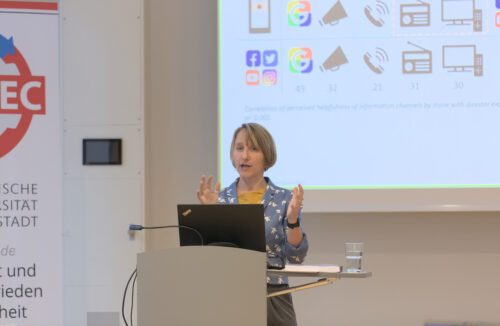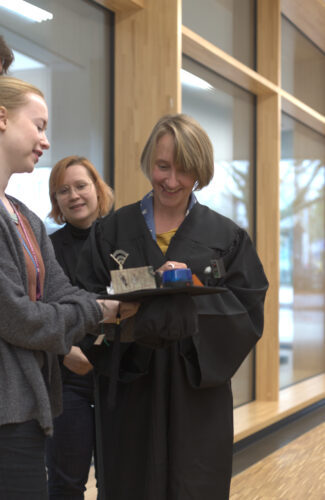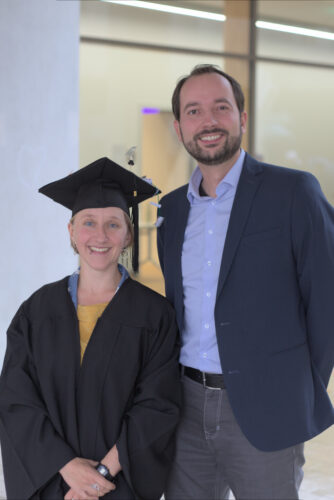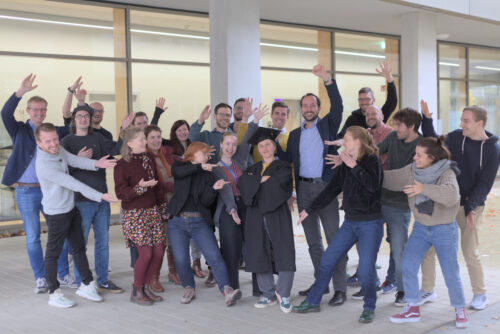Jasmin Haunschild hat am Freitag, den 17. November 2023 mit ihrer Disputation den letzten Teil auf dem Weg zum „Dr. rer. nat.“ am Fachbereich Informatik der Technischen Universität Darmstadt bestanden. Ihre Dissertation “Enhancing Citizens’ Role in Public Safety: Interaction, Perception and Design of Mobile Warning Apps” wurde von Prof. Dr. Dr. Christian Reuter als Betreuer und Erstreferent sowie Prof. Dr.-Ing. Frank Fiedrich (Fachgebiet Bevölkerungsschutz, Katastrophenhilfe und Objektsicherheit von der Bergischen-Universität Wuppertal) als Korreferent begutachtet und dem Fachbereich Informatik zur Annahme empfohlen. Die mündliche Prüfung fand unter dem Vorsitz von Prof. Dr. Marco Zimmerling (Vernetzte Eingebettete Systeme) statt. Neben den beiden Referenten waren Prof. Dr. Jan Gugenheimer (Mensch-Computer-Interaktion) sowie Prof. Dr. Joachmin Vogt (Arbeits- und Ingenieurpsychologie) als weitere Prüfer beteiligt.
Das gesamte PEASEC-Team gratuliert Dr. Jasmin Haunschild herzlich zu der erfolgreichen Verteidigung ihrer Doktorarbeit!
Die Dissertation:
Enhancing Citizens’ Role in Public Safety: Interaction, Perception and Design of Mobile Warning Apps
The experience of the Corona virus pandemic and the Russian war in Ukraine have emphasised the possibility of the occurrence even of low-probability safety and security hazards and their severe impacts. Therefore, increasing disaster resilience is essential. It requires a culture of preparedness – the engagement of individuals and communities in activities and practices that enhance their readiness for potential disasters. However, many citizens across European countries do not feel well-prepared and it is often difficult to engage citizens in public safety. Mobile warning apps can be an important part of a culture of preparedness, disseminating reliable information from disaster management agencies, helping citizens achieve situational awareness and take effective measures. While warning apps are offered in several countries, users’ expectations of these tools remain partly unclear and different designs have rarely been explored.
Therefore, the aim of this dissertation is to investigate mobile crisis apps’ potential for enhancing citizens’ role in public safety. While studies in crisis informatics have investigated warning channels and e-government studies have investigated technology adoption and citizen engagement, the two have not been brought together. Examining mobile warning channels, particularly warning apps, from the user perspective, the dissertation seeks to increase user engagement in disaster prevention and response by increasing warning app adoption. This will be done by investigating use and perception of such apps, as well as by developing design interventions that increase citizens’ contributions to public safety. To do this, firstly, representative and qualitative surveys are conducted, exploring the user perspective on warning apps, identifying trends and changes over time and comparing their usefulness to other sources. By investigating the COVID-19 pandemic and changes in risk cultures following severe crises since 2020, the studies analyse the impact of crisis experience on personal crisis responsibility and trust in emergency management through a comparative survey. Secondly, to enhance crisis preparedness, different versions of preparedness features are developed and evaluated in an experiment.
The results show that citizens believe that warning apps are useful, and those who used a warning app in a crisis report it to be one of the most helpful sources of information. In line with the theory of risk culture, the apps are preferred to social media in crises in Germany. Warning app adoption increased over time in Germany, while feature and design preferences remained largely stable. Analyses of the impacts of particular crises show that the lack of concise and reliable agency information about regulations put in place to manage the COVID-19 pandemic outbreak left an informational gap, that was filled only slowly by warning apps. With regard to involving citizens in crisis response through crisis preparedness, the results show that a persuasively designed preparedness feature can increase the taking of preparedness measures. In addition, extending warning apps by preparedness features can increase warning app’s perceived usefulness. However, using an app incurs costs in terms of effort and ressources that prevent users from adoption, which can be avoided by using a messenger bot, thus promising a wider reach of warnings to citizens.
Ausgewählte Veröffentlichungen im Rahmen der Promotion:
Preparedness Nudging for Warning Apps? A Mixed-Method Study Investigating Popularity and Effects of Preparedness Alerts in Warning Apps
International Journal of Human-Computer Studies ;172:102995. doi:https://doi.org/10.1016/j.ijhcs.2023.102995
[Download PDF]
Perceptions and Use of Warning Apps – Did Recent Crises Lead to Changes in Germany?
Mensch und Computer 2022 – Tagungsband New York. doi:10.1145/3543758.3543770
[Download PDF]
Citizens‘ Perceived Information Responsibilities and Information Challenges During the COVID-19 Pandemic
GoodIT ’21: Proceedings of the Conference on Information Technology for Social Good . doi:10.1145/3462203.3475886
[Download PDF]
Bridging from Crisis to Everyday Life – An Analysis of User Reviews of the Warning App NINA and the COVID-19 Information Apps CoroBuddy and DarfIchDas
CSCW ’21 Companion: Conference Companion Publication of the 2021 on Computer Supported Cooperative Work and Social Computing Virtual Event, USA. doi:10.1145/3462204.3481745
[Download PDF]
Towards Resilient Critical Infrastructures – Motivating Users to Contribute to Smart Grid Resilience
i-com – Journal of Interactive Media ;20(2):161–175. doi:10.1515/icom-2021-0021
[Download PDF]
Warning the Public: A Survey on Attitudes, Expectations and Use of Mobile Crisis Apps in Germany
Proceedings of the European Conference on Information Systems (ECIS) .
[Download PDF]
Sticking with Landlines? Citizens‘ and Police Social Media Use and Expectation During Emergencies
Proceedings of the International Conference on Wirtschaftsinformatik (WI) (Best Paper Social Impact Award) Potsdam, Germany. doi:10.30844/wi_2020_o2-haunschild
[Download PDF]

